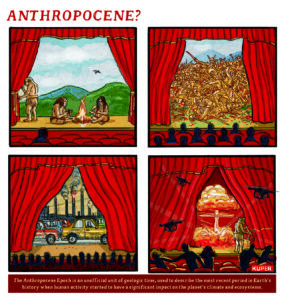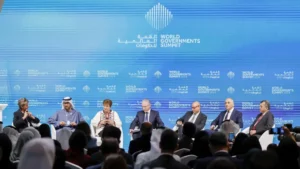Why Saudi Extremism Is an Argument for Electric Cars, Wind and Solar Energy
Saudi Arabia has gotten too big for its britches, and the oil-producing Middle East is turning even more unstable. And if you are an American, it is your fault.
By Juan Cole / Informed Comment
Saudi Arabia has gotten too big for its britches, and the oil-producing Middle East is turning even more unstable. Not to mention that global warming is getting worse and worse because of burning fossil fuels like petroleum.
And it is your fault. If you are an American, your country imports 1.1 million barrels of petroleum every day from Saudi Arabia. Every time you fill up at the pump, you are enriching the Saudi elite and making the world more unstable.
In the European Union, Statoil and Saudi Arabia account for 20% of imports of petroleum.
The obvious solution to this problem, of instability, extremism and climate change emanating from Riyadh, is electric vehicles, wind turbines and solar panels. They should be adopted as quickly as humanly possible.
Cambridge Econometrics concluded that Europe could make its energy supplies secure by “decarbonization,” that is, getting off gasoline/ petrol, coal and natural gas. Transport & Environment, reporting on the study, added, “A shift to electric vehicles would lead to a 1% increase in EU GDP, create up to 2 million new jobs and reduce emissions from cars and vans 83% by 2050, according to the study.”
This plan is no pie in the sky. It is already happening. Solar and wind are already producing more electricity in the UK than dirty coal. All we have to do is finish off coal and natural gas with renewables, and then plug electric vehicles into the green grid.
Saudi Arabia is denying that it has blockaded Qatar, since it says it is allowing goods and people in and out. How kind. 90 percent of Qatar’s food came overland through Saudi Arabia, so cutting off that lifeline is certainly a blockade. Qatar can fly in or ship in food, but at a premium, and many guest workers may not be able to afford it at those prices. The Saudis are trying to cripple the Qatari civilian economy, which is a war crime.
Now it and its allies are pressuring the United States to close down al-Udeid air base, from which most sorties against ISIL and the Taliban are flown. This is rich, since back in the 1990s when the US leased a Saudi air base to fly sorties over Iraq, radical Saudis like Usama Bin Laden claimed that this lease was a form of American military occupation of the Muslim holy land. Bin Laden gave this US presence as one of the reasons for his strike at New York and Washington on September 11, 2001. So are the Saudis roping us back into this situation? Note that Saudi Arabia has flown almost no sorties against ISIL, and defeating the latter doesn’t seem to have been high on Riyadh’s to-do list. Qatar has been far more helpful in the anti-terror fight than has Saudi Arabia.
In addition, Saudi Arabia has since spring of 2015 conducted a campaign of indiscriminate bombing against Yemen civilians and key civilian infrastructure in Yemen, leaving millions hungry, hundreds of thousands displaced, thousands dead, and tens of thousands sick with cholera. The war is ostensibly against the Houthi militia, but it is in fact being waged against Yemenis, especially the northwestern Zaydi population, in hopes that a war of attrition can bring the whole country to its knees. (This is a war crime; but then the Saudis bought their way onto the UN human rights committee, so as to deflect international condemnation). The Saudi war on little Yemen will add to the refugee crisis, promote instability, and result in more terrorism.
All this is not to mention the sinister role that Saudi Arabia has played in spreading around its militantly fundamentalist version of Wahhabism, which delights in vigilante morals police and discourages friendly relations between Muslims and others. (Qatar is also a Wahhabi society but mostly has relatively liberal emphases). Tolerant, Sufi strains of Islam (which are appreciated by many in Qatar) are hated in the Saudi Wahhabi heartland of Najd. Riyadh has virtually waged war on Sufism in Pakistan and Indonesia, both of which had been much more open and tolerant before they started coming under Saudi influence.
Putting solar panels on our homes, where we own them and can afford to do so, and then running an electric car like a Chevy Bolt or other similar off of these panels, is the single most important thing most of us can do to combat not only catastrophic climate change but also the menace of Saudi bullying and extremism-promotion. Around the world, about 15 percent of the toxic carbon dioxide that causes global warming comes from burning petroleum in cars, trucks and other vehicles. If we solve this one, we only have 85% of the problem to go. (And a lot of the rest comes from burning coal and natural gas, which we should replace with wind and solar so as to run our electric cars and buses cleanly). But, defunding the Saudi hard line version of Wahhabism would make it all worthwhile, just by itself.
Your support matters…Independent journalism is under threat and overshadowed by heavily funded mainstream media.
You can help level the playing field. Become a member.
Your tax-deductible contribution keeps us digging beneath the headlines to give you thought-provoking, investigative reporting and analysis that unearths what's really happening- without compromise.
Give today to support our courageous, independent journalists.






You need to be a supporter to comment.
There are currently no responses to this article.
Be the first to respond.